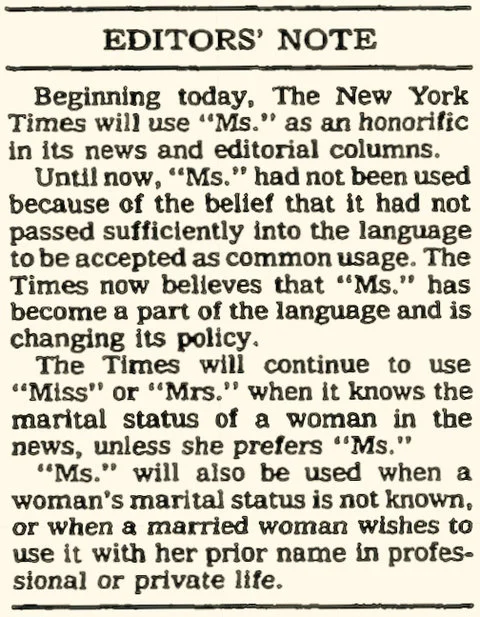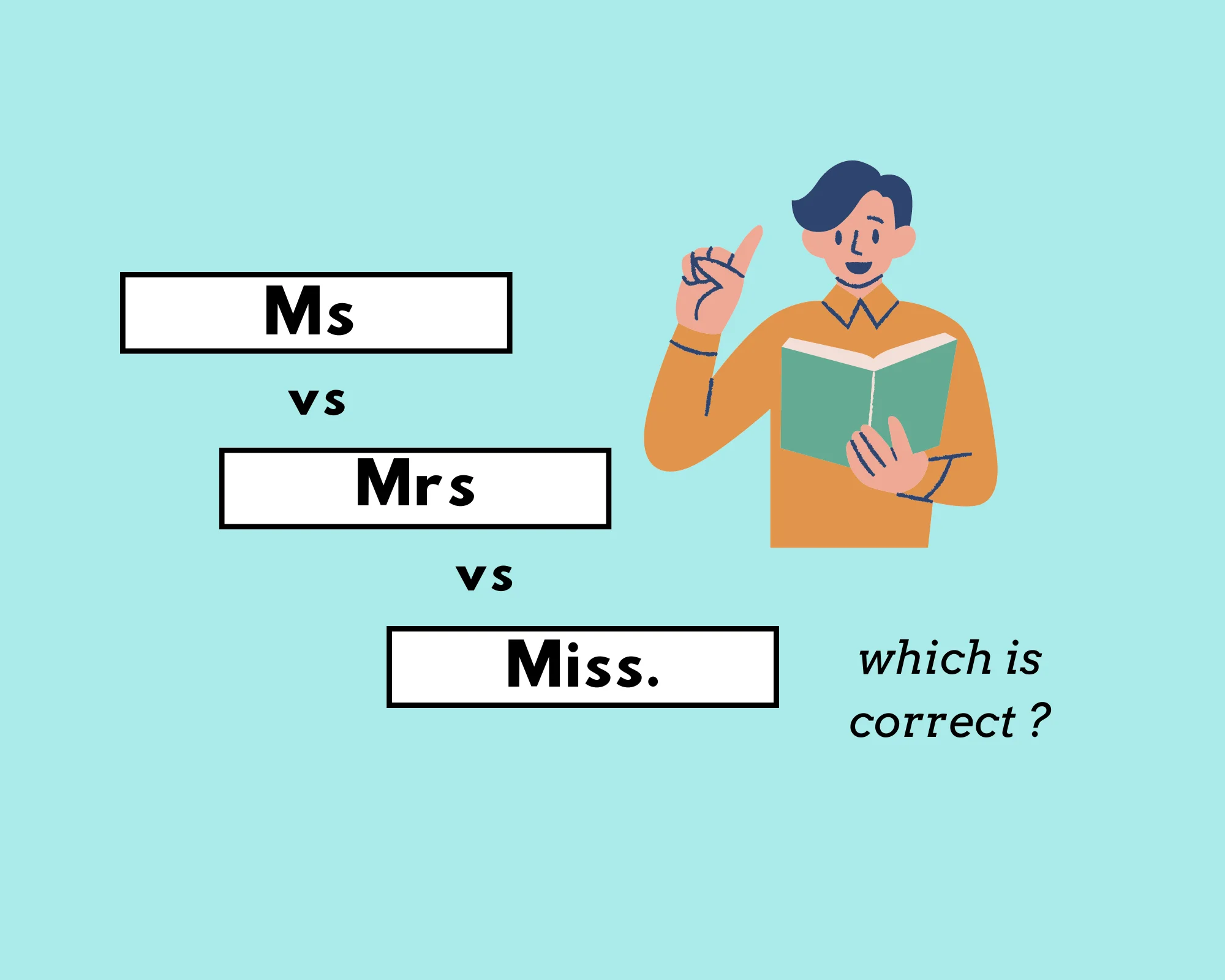Contents
Toggle
Ms., Mrs., and Miss
What’s the difference between Ms., Mrs., and Miss? There are differences between each of these abbreviations. Learn their differences and how to use each one correctly, in this episode of Grammarflex—where learning happens.
When referring to a person’s title or honorific, whether in conversation or writing, it’s important not to mess this up since whoever receives the address could be offended. When in doubt, in most cases it’s okay to forego these formal titles and replace them with other acceptable forms of address, such as ‘dear’, or even ‘hello.’ That said, it’s still worthwhile learning the differences between these abbreviations, how to use them correctly, and what they mean. Let’s get to it!
What’s the meaning of Miss?
Miss (noun) is a respectful way to address a younger woman that is unmarried. The dictionary defines Miss as:
a title prefixed to the name of an unmarried woman or girl. (Merriam-Webster)
Miss is then often used to address younger, unmarried women; or also in cases where the person’s marital status is unknown.
Examples of sentences with Miss:
The following sentences demonstrate the correct use of the title Miss. Example sentences are from Grammarly’s blog on Miss, Mrs. and Ms:
1. Miss Penelope Edwards won the spelling bee.
2. Go ahead this way, Miss.
3. The reservation is set for 8 p.m., Miss.
4. Excuse me, Miss, you dropped your bag.
5. Miss, your table is right this way.
The meaning of Mrs.:
Mrs. (pronounced mis–iz) is a formal title and way to address a married woman or a widowed woman. Women that keep their last name after marriage may want to indicate their marital status through Mrs. Mrs. is used before the person’s name: ‘Mrs.Johnson was my first-grade teacher.’
The title Mrs. sometimes includes the partner’s name before the woman’s—though this practice is less common now since most women prefer their name be addressed independently (makes sense.) In cases where you know the person is married, and want to show respect and a touch of formality, Mrs. is the way to go.
Usage note: As a rule of thumb, Mrs. is appropriate in formal settings, especially when the goal is to convey respect or deference. However—if the person addressed has a more suitable honorific or title, say, if they are a doctor or professor, they may prefer the Dr. title, as opposed to the Mrs. being discussed. In less formal settings, or if they ask to drop the formal Mrs. title, follow their preference.
Examples of sentences with Mrs.:
The following sentences demonstrate the correct use of Mrs. as a form of address. Example sentences are from Grammarly’s blog on Miss, Mrs. and Ms:
1. Mrs. Liu was my seventh-grade history teacher.
2. Address the envelope to Mrs. Gary Belmont.
3. Mrs. Jones is an incredible impressionist artist.
4. It’s lovely to meet you, Mrs. Lopez.
5. Mrs. Anderson has been babysitting our kids over the past decade—she’s a wonderful nanny.
The meaning of Ms.

Ms. first use in the NY Times. Source: Ms Sheila Michaels RIP by Anorak, 9th, July 2017
Ms. (pronounced miz) arose as an honorific in the 1980s after a news article written in the New York Times stated that they will use the abbreviation to address women of whom’s marital or domestic situation is unknown or undisclosed. Finally …it was eventually realized that not all forms of address should hinge on domestic or marital status. Ms., which is intentionally ambiguous towards the addressee’s marital status, and is used in those contexts.
Are Miss, Ms. and Mrs. capitalized?
We capitalize Miss, Mrs. and Ms. in writing, since they are abbreviations that address specific people. Miss, Ms. and Mrs. are all proper noun titles. Proper nouns are always capitalized, no matter where they appear in a sentence. Proper nouns point out specific people, places, things or ideas; and take on a capital letter to signify that they are, in fact, proper nouns. Example of a proper noun vs a common noun is the following: A woman vs Susan Smith
Common nouns are non-specific and work in generalities—that’s why they are common. Proper nouns hone in on a particular person or thing, and use a capital letter because they refer to a single entity. Miss, Mrs. and Ms. when used, each refers to a single individual or person. For this reason, they should always use a capital letter.
Meaning of Mx
Mx (pronounced miks) is a gender-and-marital-status neutral honorific for individuals that are gender neutral, and/or married or not.
Do Ms. and Mrs. need periods?
British English typically omits the periods after title abbreviations. American English includes periods after title abbreviations, such as Mr., Mrs., Ms., Dr., and so on.
First known use of Ms. in English
According to Wikipedia, “The earliest known proposal for the modern revival of Ms. as a title appeared in The Republican of Springfield, Massachusetts, on November 10, 1901:”
There is a void in the English language which, with some diffidence, we undertake to fill. Every one has been put in an embarrassing position by ignorance of the status of some woman. To call a maiden Mrs is only a shade worse than to insult a matron with the inferior title Miss. Yet it is not always easy to know the facts…
Now, clearly, what is needed is a more comprehensive term which does homage to the sex without expressing any views as to their domestic situation, and what could be simpler or more logical than the retention of what the two doubtful terms have in common. The abbreviation Ms is simple, it is easy to write, and the person concerned can translate it properly according to circumstances. For oral use it might be rendered as “Mizz,” which would be a close parallel to the practice long universal in many bucolic regions, where a slurred Mis’ does duty for Miss and Mrs alike. (Wikipedia on the revival of Ms.)
In review: miss, mrs., and ms.
1. Miss is used as a formal way to address a younger, unmarried woman.
2. Mrs. is the formal way to address a woman that is either married or widowed.
3. Ms. is used as an option to address women where the marital status is either not known or not disclosed. Ms. leaves the marital status ambiguous.
Read up on other posts!
What’s the difference between they’re, their, and there?
Sources
- Definition of honorific
- Grammarly’s blog on the difference between miss, mrs and ms
- Merriam-Webster on Miss
- British English periods after Ms. or Mrs
- Today in Feminist History: The New York Times Says “Ms.”










